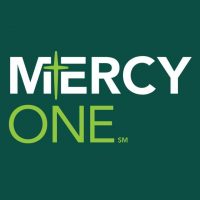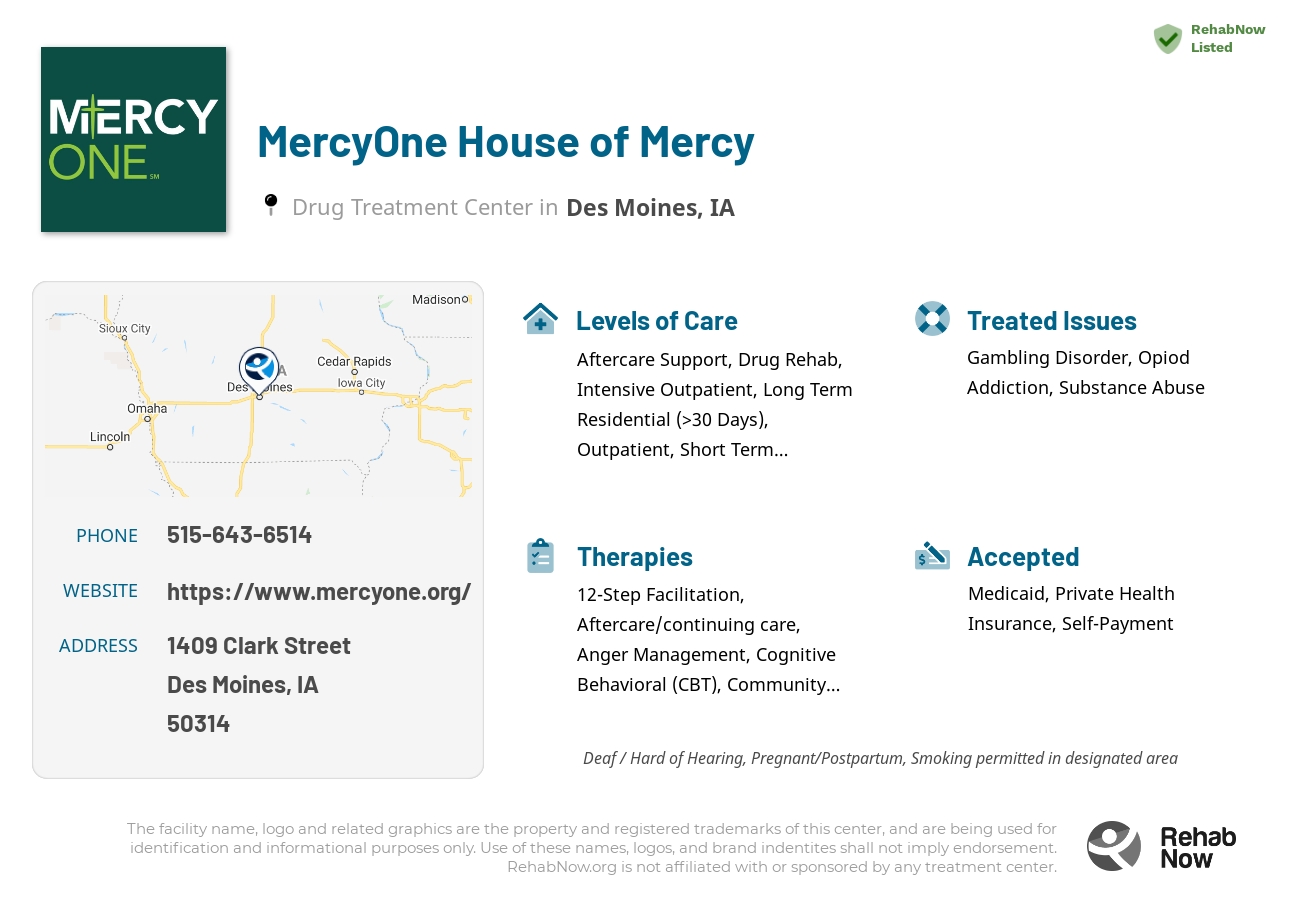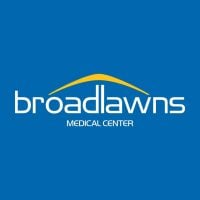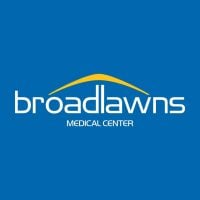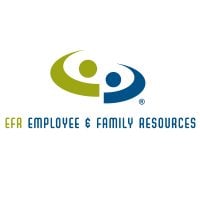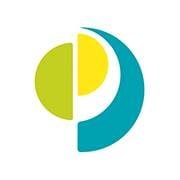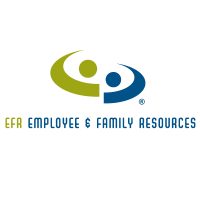MercyOne House of Mercy
Drug Rehab Center in Des Moines, Iowa
MercyOne House of Mercy is a CARF-accredited and state-licensed addiction treatment facility in Des Moines, IA offering comprehensive services for individuals suffering from opioid addiction, substance abuse and alcohol dependence such as aftercare support, drug rehab, intensive outpatient, outpatient and residential programs with individualized care plans that incorporate holistic approaches to healing the body and mind.
About This Des Moines, IA Facility
MercyOne House of Mercy is an Addiction Treatment Facility located in Des Moines, Iowa. Established in 1988, this center specializes in treating individuals suffering from opioid addiction, substance abuse, drug addiction, alcoholism, and mental health issues. They offer various levels of care, including residential, outpatient, intensive outpatient, and aftercare support. MercyOne House of Mercy is proud to be accredited by CARF and holds a state license, ensuring the highest standards of quality and care for their clients. Additionally, they accept private health insurance, making their services accessible to a wide range of individuals seeking treatment.
At MercyOne House of Mercy, individuals struggling with addiction and substance abuse can find a variety of comprehensive services to support their recovery journey. Their drug rehab programs provide a safe and supportive environment for detoxification and rehabilitation. The center offers intensive outpatient programs that allow individuals to receive structured treatment while still maintaining their daily routines. With their residential programs, clients can receive 24/7 supervision and support in a structured and therapeutic environment. Additionally, MercyOne House of Mercy provides aftercare support to help prevent relapse and promote long-term recovery. Through their wide range of services, they aim to address the complex needs of individuals battling addiction and offer a path towards lasting recovery.
Genders
Ages
Modality
Additional
Accreditations
State License

CARF
The Commission on Accreditation of Rehabilitation Facilities (CARF) is a non-profit organization that specifically accredits rehab organizations. Founded in 1966, CARF's, mission is to help service providers like rehab facilities maintain high standards of care.
Conditions and Issues Treated
Substance abuse is the excessive use of any type of drug. This includes alcohol, medications and illegal drugs. Substance abuse is treated with a combination of physical and mental treatments. MercyOne House of Mercy patients detox and follow up with therapies that target the underlying cause of the addiction.
Opioid addiction is one of Iowa‘s most prominent forms of addiction. Drugs, including heroin, oxycontin, and fentanyl, are the most common. To relieve pain, or ease other ailments, they are professionally prescribed, but they are often abused because they and the feelings they give are addictive.
Addiction is treated by detoxifying the body, so the medications’ chemicals are no longer impacting the individual. MercyOne House of Mercy offers therapies to correct behavior and target the root of the problem are supplemented during and throughout treatment.
Levels of Care Offered
This center offers a variety of custom treatment tailored to individual recovery. Currently available are Aftercare Support, Drug Rehab, Intensive Outpatient, Outpatient, Residential, with additional therapies available as listed below.
Intensive Outpatient Programs (IOPs) are treatment programs suitable for people who wish to stay at home while undergoing treatment. IOPs like MercyOne House of Mercy make it possible for individuals to carry on with their responsibilities at work or school, in or near Des Moines, IA. It’s easy to find an IOP center that offers individualized treatment protocols.
In outpatient programs at MercyOne House of Mercy, the Des Moines resident can live with their family while continuing with their job or studies. Treatment includes educating the patient on drug abuse, medications, and counseling sessions at the individual or group level.
Residential treatment programs are those that offer housing and meals in addition to substance abuse treatment. Rehab facilities that offer residential treatment allow patients to focus solely on recovery, in an environment totally separate from their lives. Some rehab centers specialize in short-term residential treatment (a few days to a week or two), while others solely provide treatment on a long-term basis (several weeks to months). Some offer both, and tailor treatment to the patient’s individual requirements.
Aftercare support refers to the follow-up care provided after the initial rehab program. The quality of aftercare support plays an important role in preventing relapses and sustains recovery. Aftercare support at MercyOne House of Mercy is personalized according to the needs of the patient in Iowa.
MercyOne House of Mercy‘s Therapies & Programs
Customized individual therapy is counseling involving you and your counselor at MercyOne House of Mercy. This builds a personal and trusting relationship so you can truly be yourself and express any emotions as you feel them. Individual therapy leads to greater peace and understanding about your triggers for addiction and coping strategies to prevent relapse.
Substance abuse does a number on an individual’s relationship with other people, particularly in marriage. Spousal relationships bear the brunt of alcohol and drug dependence. Therefore, it becomes critical to submit the relationship to couples therapy to prevent straining it further. Most programs only zero in on the individual with substance addiction without factoring in the importance of the other half’s emotional support.
However, some facilities, like MercyOne House of Mercy in Des Moines, Iowa, offer couples therapy options to manage intimate partnerships amid the recovery process. Other couples-focused treatment plans can provide the patient and their partner tools to get things back to normal, support each other, and the patient’s sobriety.Group Therapy is a type of counseling that occurs between a bunch of strangers. These groups are suitable for patients who are not confined in a treatment facility, but group sessions are also common in inpatient rehab programs. Group therapy is led by a trained individual at MercyOne House of Mercy in Des Moines, IA and consists of members from different stages of recovery.
The goal of group therapy sessions is to foster hope and a sense of belonging, share information, and learn coping mechanisms. It also helps to have people who can relate to what you’re going through. Good behaviors can also be contagious, and participants can learn from one another.
Unresolved trauma is often a key reason why many patients resorted to substance abuse. Trauma could be physical abuse, sexual abuse, war, natural disasters, divorce, accident, loss of a loved one, etc. If trauma is the primary cause of substance abuse, then both issues must be addressed.
Dialectical Behavior Therapy (DBT) is an improved version of Cognitive Behavioral Therapy (CBT) DBT is a treatment of choice for people being treated at MercyOne House of Mercy whom are suffering from self-harming behaviors. Conditions such as obsessive-compulsive disorder and borderline personality disorder also benefit from DBT.
Cognitive Behavioral Therapy (CBT) is an approach and method in psychotherapy. MercyOne House of Mercy asks people to investigate how their thoughts, including habitual, negative, and inaccurate ways of thinking affect behaviors. CBT is based on the idea that rigid, inflexible ways of thinking cause people to have a limited ability to cope with stress
Rational Emotional Behavior Therapy (REBT) is a method of specific counseling that replaces negative and self-limiting thoughts with positive and productive behaviors. Self-defeating thoughts and habits can limit your possible successes. Some examples of this are procrastination, unhealthy eating and angry outbursts. You may not be aware that some unhealthy behaviors and thoughts are sabotaging your potential accomplishments.
The 12-step program is a part of substance abuse treatment offered at MercyOne House of Mercy. It was initially developed by the founders of Alcoholics anonymous. The program provides the benefit of cognitive restructuring. It refers to the process of change in the negative thoughts that leads to long-term benefits.
Some people refer to contingency management, or CM, as motivational incentives. This type of therapy is a reconditioning of the mind and responses of the body. The point of CM is to help the body understand the proper responses to behaviors should be, as well as the effects that come with both problematic and desired behaviors. The more positive choices a person makes, the more incentives they will receive, all managed with sobriety goals by MercyOne House of Mercy in Des Moines, IA.
Payment Options Accepted
For specific insurance or payment methods please contact us.
Is your insurance accepted?
Ask an expert, call (888) 674-0062
Additional Details
Specifics, location, and helpful extra information.
Des Moines, Iowa 50314 Phone Number(515) 643-6514 Meta DetailsUpdated November 25, 2023
Staff Verified
What else do people call MercyOne House of Mercy?
People have occasionally also searched for “House of Mercy in Iowa”
Patient Reviews
There are no reviews yet. Be the first one to write one.
Des Moines, Iowa Addiction Information
Iowa ranks 2nd lowest in the nation for illicit drug use, but 12% of its residents are still using these drugs every single year. Methamphetamines account for more than 90% of all drug-related prison admissions in Iowa. Alcohol is the most widely abused substance in the state, with 23% of residents admitting to heavy drinking.
In Des Moines, the number of drug-related deaths has increased in recent years. In 2013, there were 31 drug-related deaths, which is up from 26 in 2012 and 23 in 2011. The majority of these deaths were caused by heroin or prescription opioids. Some of the most commonly abused drugs include marijuana, cocaine, heroin, and prescription opioids. If you or someone you know is struggling with addiction, please reach out for help.
Treatment in Nearby Cities
- Bayard, IA (50.5 mi.)
- Manning, IA (76.6 mi.)
- Iowa City, IA (109.0 mi.)
- Guthrie Center, IA (45.0 mi.)
- Shenandoah, IA (107.5 mi.)
Centers near MercyOne House of Mercy
The facility name, logo and brand are the property and registered trademarks of MercyOne House of Mercy, and are being used for identification and informational purposes only. Use of these names, logos and brands shall not imply endorsement. RehabNow.org is not affiliated with or sponsored by MercyOne House of Mercy.
